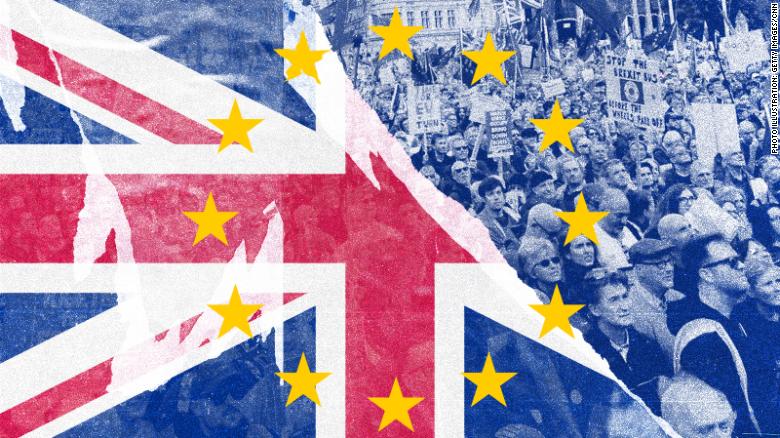Brexit wrecked Britain and it hasn’t even happened yet

The UK was supposed to exit the bloc on Thursday, in a much-heralded Halloween deadline. But MPs, desperate to avoid a no-deal Brexit, forced Prime Minister Boris Johnson to ask Brussels for a third delay. The EU granted this three-month extension on Monday, meaning the UK will now stay part of the bloc, with all its advantages and obligations, until January 31 2020. Before that, there’s the small matter of the country’s general election on December 12.From the outside, nothing much has changed yet. From the inside, however, the UK has undergone a radical and at times ugly transformation. The June 2016 referendum has helped set off a chain of events that has impacted many aspects of life in the country.Brexit remains extremely divisive. Opinion polls show the country is split pretty much down the middle between those who want to leave the EU as soon as possible and those who are still hoping the country could somehow remain in the bloc. This debate hasn’t always been civilized. Politicians advocating for a softer version of Brexit have been called “saboteurs” by elements of the press, while the opposition has accused the government of staging a “coup.” Judges have been called “enemies of the people” for ruling against the government.Official statistics from the UK Home Office show that hate crime increased during and immediately after the referendum. ]]]]>]]>The Home Office says that while the rise in hate crime has been down mainly to better reporting, there have been spikes following certain events, “such as the EU referendum and the terrorist attacks in 2017.” The crimes have ranged from verbal abuse to murder. Just before the referendum, the Labour MP and prominent Remain campaigner Jo Cox was killed by a man with extreme right wing views. Goodbye and good luckImmigration was the most important issue for voters ahead of the referendum, according to an Ipsos Mori poll. Under EU rules, citizens of any member state are allowed to work and live anywhere across the bloc without the need for a visa. Brexit was largely pitched to UK voters by its supporters as an opportunity to regain control over the country’s immigration policy. The hostile rhetoric, coupled with legal uncertainty since the vote, has made the UK a much less popular destination for people from elsewhere in the EU. Fewer Europeans are arriving in the country and many of those settled there are leaving. ]]]]>]]>Jay Lindop, Director of the Centre for International Migration at the Office for National Statistics, said migration patterns have changed since the EU referendum vote. “EU net migration, while still adding to the population as a whole, has fallen to a level last seen in 2009,” Lindop said. “We are also now seeing more EU8 citizens — those from Central and Eastern European countries, for example Poland — leaving the UK than arriving,” she added.The decision to leave the EU has also had a profound effect on people’s wallets. The value of the British pound slumped significantly after the vote, because investors worried about its impact. That made imported goods and foreign holidays a lot more expensive for Brits. The weak pound has pushed inflation higher. When prices rise faster than wages, people get poorer. ]]]]>]]>This trend has reversed even as the UK slid into the limbo of delays and uncertainty, but the pound’s value has remained volatile. And because the UK economy is fueled largely by consumer spending, a squeeze on consumers means a downturn for the wider economy. The UK went from being an economic frontrunner among the world’s biggest economies to one of the weakest ones. ]]]]>]]>Deepening divisionsWhen previous Prime Minister David Cameron called the referendum in 2016, he was fulfilling a promise he made ahead of the 2015 general election. His pledge to hold a vote on EU membership helped Cameron secure an outright majority for his second term after presiding over a coalition cabinet, with the Liberal Democrats, in his first term. Cameron’s Conservative Party had been split in its approach to the European Union for decades, and a key motivation for calling the vote was to reunite the party. Simply put, Cameron was hoping he’d win the referendum and put the issue to rest once and for all.That backfired spectacularly. Cameron, and his successor Theresa May, both lost their jobs to Brexit. The Conservative Party has become ever more split since the vote, with Brexiteers and Remainers pitted against each other. ]]]]>]]>The parliamentary majority Cameron secured in 2015 has gone. May lost the outright majority in a 2017 snap election, which she called in hope of securing a bigger majority. That majority has plunged further under current PM Johnson, as more MPs resigned or were fired over their Brexit actions. In an attempt to break the UK’s political impasse, the country is now heading for its third general election in four years in December. As long as it’s clear, the result of that vote may finally clarify the future of Brexit. But one thing is certain: not everyone will be happy with it.





